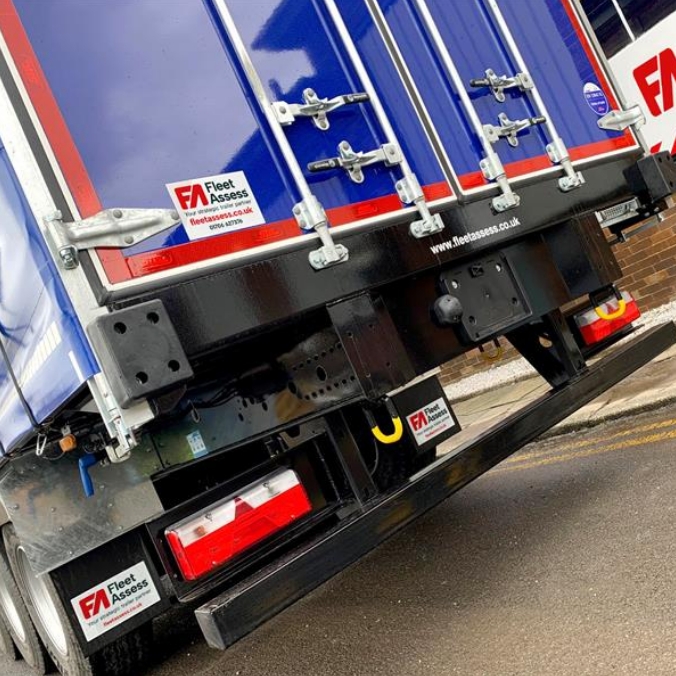HGV trailers are central to the safe movement of heavy goods vehicles (HGVs) and commercial vehicles across the UK. In short, yes, HGV Trailers do need safety inspections – they are a legal requirement under DVSA rules, and they should follow the inspection manual and the Guide to Maintaining Roadworthiness. Consistent vehicle safety inspections keep road safety standards high and ensure vehicles and trailers remain fit for use between annual test dates, supporting compliant and efficient operations.
In this article:
- Why are safety inspections important?
- What’s in a safety inspection?
- Who can complete HGV trailer inspections?
- Do HGV trailers need an MOT?
- Is trailer rental the best option?
- Speak to Fleet Assess
Why are safety inspections important?
HGV inspections exist to keep people and freight safe while ensuring compliance. Regular vehicle inspection prevents minor defects from becoming major issues that cause breakdowns, collisions or roadside prohibitions, and it shows that an operator takes their responsibilities seriously with the Vehicle Standards Agency (DVSA) and the Traffic Commissioner. A structured preventative maintenance plan also ensures workshops don’t become overloaded and helps with advanced parts purchasing, so fleets can operate predictably across busy periods.
Aside from predictability, it’s also more cost-effective to implement preventative maintenance, as replacing worn parts such as brake pads, correcting tyre wear or making repairs during a planned inspection is often much cheaper than the costs of recovery, delay penalties and secondary damage from component failure. Planning regular inspection activity over the next 12 – 15 months helps ensure each trailer reaches its annual test in known condition.
For context on rising costs, see our recent blog post on Why the HGV Cost Repair Increase Is a Wake-Up Call for Fleet Owners.
What’s in a safety inspection?
A safety inspection follows the DVSA inspection manual and the latest Guide to Maintaining Roadworthiness. It covers both the tractor and the HGV Trailer, with trailer-specific focus where wear and loading are highest.
Daily Walkaround Checks
Drivers complete daily walkaround checks before first use and at handover points. For trailers, this means tyres and wheels, lamps and reflectors, number plates, indicators and brake lights via the suzie connections, landing legs, bodywork, spray suppression, load restraint points and the fifth-wheel or drawbar coupling. Any defect must be recorded and reported, and the trailer should not be used until fixed.
Inspecting Key Safety Components
Formal HGV Trailer inspection centres on components that directly affect road safety i.e. braking system and service lines, ABS/EBS wiring and sensors, suspension, axles, hubs, wheel fixings, tyres and chassis structure. Trailer-specific items such as the kingpin, rubbing plate, rear underrun protection, sideguards, doors or curtains, the floor and load securing receive particular attention because they experience sustained wear in service.
Annual Testing
The DVSA annual test (commonly called an HGV MOT) confirms roadworthiness for the next year, but it does not replace routine checks throughout the year.
Documentation and Inspection Sheets
Each inspection needs a correctly completed HGV trailer Inspection Sheet listing items that have been checked, the results, inspector details and rectification work. Records must be retained and easy to retrieve for DVSA visits or Traffic Commissioner reviews. Paperwork is a key part of the safety system, and good documentation helps spot repeat defects across a fleet and makes it easier to evidence compliance on request.
Preventative Maintenance and Record-Keeping
Inspection findings should feed into a preventative maintenance plan. Tracking age, mileage, duty cycle and defect history allows components to be replaced before failure. Accurate records across 12 – 15 months reduce surprises between annual test appointments and support safer operating processes and decision-making.
Who can complete HGV trailer inspections?
Inspections should be carried out by competent people using suitable equipment, i.e. in-house maintenance team trained to DVSA standards, a trusted external maintenance provider or an approved testing facility. In all cases, the inspection manual should be followed, equipment should be calibrated and clear records showing what was inspected should be kept, including the date of inspection and who signed it off, so compliance can be demonstrated at any time.
Do HGV trailers need an MOT?
Yes, trailers require a DVSA annual test – frequently referred to as an HGV MOT – even though it differs from the standard vehicle MOT. Passing the annual test confirms the trailer meets legal safety standards on the day of test, though ongoing HGV Inspections and routine vehicle safety inspections are still necessary to keep the trailer roadworthy between test dates.
Is trailer rental the best option?
For many operators, trailer rental is a practical way to meet inspection and maintenance obligations without adding additional pressure to internal teams. With commercial trailer rentals from Fleet Assess, trailers are supplied in a safe, compliant condition and backed by planned inspections, roller brake test schedules and responsive repairs. This keeps fleets moving and reduces admin time, plus also supports seasonal peaks and covers unplanned demand without the long-term commitment.
Where ownership is the preferred option, our commercial trailer sales provide fully complaint assets from day one. If extending your asset life makes more sense for your business, refurbishing HGV trailers can help avoid early replacement and ensure your fleet meets road safety requirements. For practical cost control and utilisation strategies, see our recent blog on How to reduce transport costs with HGV trailer hire.
Speak to Fleet Assess
Fleet Assess supports operators with compliant, well-maintained HGV trailer fleets across rental, sales and refurbishment. If you need advice on inspection intervals, roller brake test planning or building a preventative maintenance schedule for vehicles and trailers, call 01706 627376 or visit our trailer rentals page to get started.

